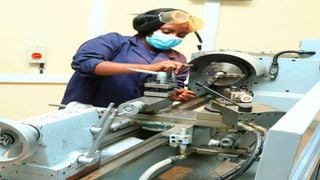
A mechanical engineering student operates a lathe machine at Nyeri Technical Institute.
| File | Nation Media GroupEducation
Premium
Regional curriculum to make Tvet course credit transfers easier
Kenyan students at technical and vocational institutes will be able to transfer course credits to similar colleges in neighbouring countries once a harmonised regional curriculum is adopted.
Technical Training Principal Secretary Margaret Mwakima said this will eliminate the need for trainees to retake courses when they move to another country.
A harmonised framework for technical and vocational education and training (Tvet), she added, will aid regional integration and promote labour movement and skills transfer in East Africa and the rest of the continent.
“A regional Tvet qualification framework (RTQF) will bend the curve of history for a more inclusive and shared prosperous future not only for the countries in East Africa but Africa at large,” she said.
For instance, Kenya’s curriculum qualifications are regulated by the Kenya National Qualification’s Authority (KNQA).
Once the regional curriculum is harmonised, a student in Kenya can move to the next level of education in another country without seeking to be qualified by regulatory bodies in that jurisdiction.
Greater access to education
Dr Mwakima added that the regional Tvet qualifications framework is an investment in greater access to education in the region and a basis for mutual trust.
“It is also a systematic approach to human resource development for lifelong learning,” she said.
Seven countries in East Africa - Kenya, Uganda, Tanzania, Burundi, Rwanda, Ethiopia and South Sudan - are discussing how to adopt the harmonised framework, whose formulation began in March last year.
This is in line with a regional integration project that seeks to increase access and improve “the quality of Tvet programmes in selected regional flagship Tvet institutes”.
Three countries - Kenya, Ethiopia and Tanzania - are part of the project, called the East Africa Skills for Transformation and Regional Integration Project (EASTRIP), which aims to improve the quality of Tvet programmes at 16 selected regional centres of excellence.
In Kenya, the centres are Meru National Polytechnic, Kenya Institute of Highways and Building Technology, KenGen Geothermal Institute and Kisumu National Polytechnic.
Regional collaboration
Under EASTRIP, the process focuses on enhancing regional collaboration, including standards and mutual recognition of qualifications.
Priority areas include manufacturing, agro-processing, energy, transport and infrastructure, and ICT.
EASTRIP participating countries need to establish mutual recognition agreements to facilitate the movement of skilled workers and help them find work outside of their home countries, said Prof Gaspard Banyankimbona, Inter-University Council of East Africa (IUCEA) executive secretary.
“The benefits of free movement of skilled labour among participating Tvet institutions and in the EAC (East African Community) region are enormous. It has the potential of addressing the skills gaps and shortage of skills to support economic development,” he said.
Low investment in TVETs has led to inadequate quality training opportunities in EAC partner states, said Christophe Bazivamo, the bloc’s deputy secretary-general for productive and social sectors.
“Through harmonisation of the Tvet sector, we will be able to develop other relevant regional policies and frameworks,” he said.
In May 2017, EAC heads of government declared the region a common higher education area. That effectively ushered in a regime where national higher education and training systems are guided by a common framework, with harmonised curricula, examinations and certification, among other areas.





